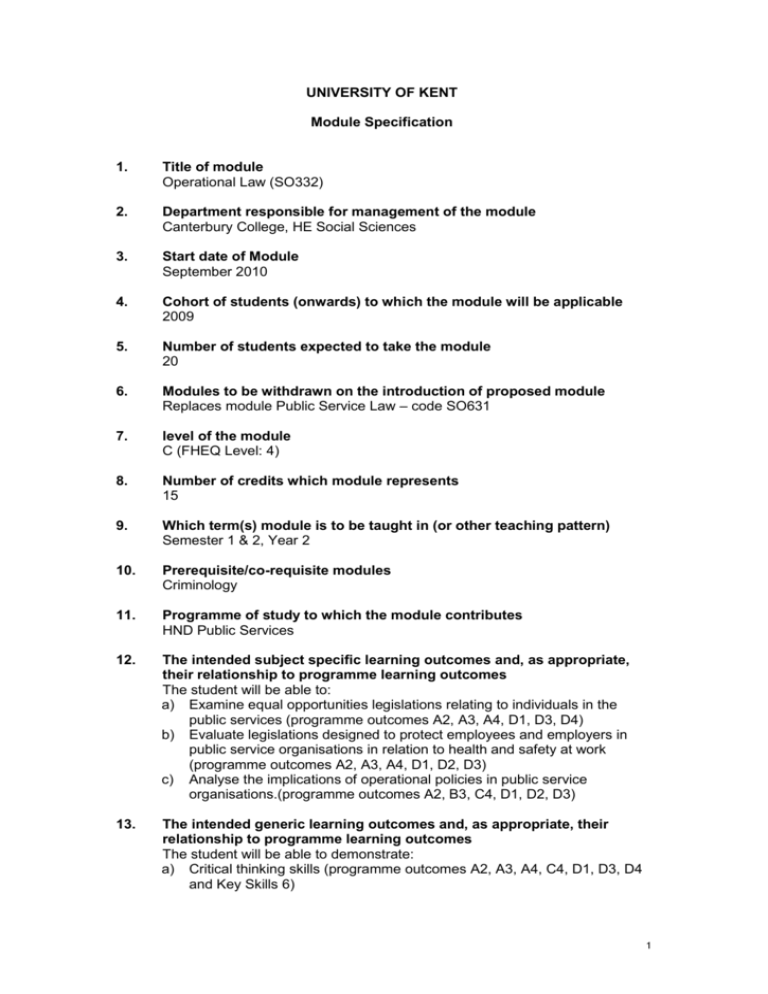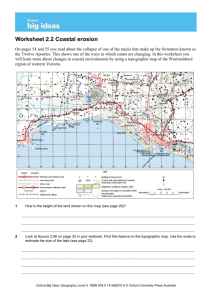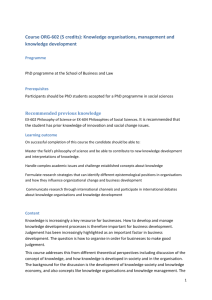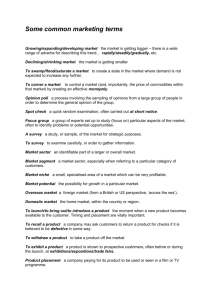1 - University of Kent
advertisement

UNIVERSITY OF KENT Module Specification 1. Title of module Operational Law (SO332) 2. Department responsible for management of the module Canterbury College, HE Social Sciences 3. Start date of Module September 2010 4. Cohort of students (onwards) to which the module will be applicable 2009 5. Number of students expected to take the module 20 6. Modules to be withdrawn on the introduction of proposed module Replaces module Public Service Law – code SO631 7. level of the module C (FHEQ Level: 4) 8. Number of credits which module represents 15 9. Which term(s) module is to be taught in (or other teaching pattern) Semester 1 & 2, Year 2 10. Prerequisite/co-requisite modules Criminology 11. Programme of study to which the module contributes HND Public Services 12. The intended subject specific learning outcomes and, as appropriate, their relationship to programme learning outcomes The student will be able to: a) Examine equal opportunities legislations relating to individuals in the public services (programme outcomes A2, A3, A4, D1, D3, D4) b) Evaluate legislations designed to protect employees and employers in public service organisations in relation to health and safety at work (programme outcomes A2, A3, A4, D1, D2, D3) c) Analyse the implications of operational policies in public service organisations.(programme outcomes A2, B3, C4, D1, D2, D3) 13. The intended generic learning outcomes and, as appropriate, their relationship to programme learning outcomes The student will be able to demonstrate: a) Critical thinking skills (programme outcomes A2, A3, A4, C4, D1, D3, D4 and Key Skills 6) 1 b) c) d) e) f) g) Ability to work with complex material (programme outcomes A2, A3, A4, C4, D1, D3, D4 and Key Skill 5) Ability to analyse problems and identify appropriate solutions (programme outcomes B3, D1, D2, D3 and Key Skills 5, 6) Ability to work and study independently and utilise resources effectively (programme outcomes B3, D1, D2, D3 and Key Skills 5, 6) Communication and report writing skills (programme outcomes B3, D1, D2, D3 and Key Skills 1, 5) Research skills in legal documents (programme outcomes C4, D1, D3, D4 and Key Skills 5) Effective self-management skills (programme outcomes D1, D3, D4 and Key Skills 5) 14. A synopsis of the curriculum The module will enable you to examine current legislations affecting the operation and management of public service organisations. You will gain an understanding of procedures aiming to eradicate oppressive practice and support equality of opportunities. Topics will include Description of the different types of equal opportunity legislations; Evaluation of the effectiveness of equal opportunity legislations as applied in public service organisations; Analysis of anti-oppressive practice in public service organisations; Description of the problems health and safety are likely to encounter in public service organisations; Evaluation of the effects of the European Union directives on health and safety at work legislation; Description of risk assessment procedure with an evaluation of its process; Examination of grievance procedure; Description of the process of industrial tribunals; Examination of the role of trade unions and professional associations in public service organisations; Evaluation of initiatives of minority groups in public service organisations; Analysis of termination of employment contract: unfair, wrongful with possible remedies. 15. Indicative Reading List Black J et al, 2007, A Practical Approach to Family Law, 8th edition, Oxford University Press, ISBN 0199212767. Clements P et al, 2009, The Equal Opportunities Handbook: How to Recognise Diversity, Encourage Fairness and Promote Anti-discriminatory Practice, 4th Edition. ISBN 0749452978. Honeyball S, 2008, Honeyball and Bowers' Textbook on Employment Law, 10th Edition, OUP Oxford. ISBN 0199235872. Kidner R et al, 2008, Blackstone's Statutes on Employment Law 2008200,18th Edition. Oxford University Press, ISBN 0199238197. Maguire M et al, 2007, The Oxford Handbook of Criminology, Oxford University Press, ISBN 0199205434 Sumner C, 2007, The Blackwell Companion to Criminology, Wiley Blackwell, ISBN: 1405175621 2 16. Learning and Teaching Methods, including nature and number of contact hours and total study hours which will be expected of students, and how these relate to achievement of the intended learning outcomes Total 150 hours. Contact 45 hrs = 3 hours of class contact time per week x 15 weeks: lectures and seminars, covering all learning outcomes. As appropriate to the material being covered, scenario-based case study material will be drawn upon, enabling learners to relate the formal principles and concepts acquired to real life situations, including their own experiences. Seminars will typically include discussions, presentations, problem solving and case studies. Students will be expected to contribute both as individuals and as part of a group. Independent study = 7 hrs per week: including required reading, research and answering assignments. 17. Assessment methods and how these relate to testing achievement of the intended learning outcomes Written report (50% weighting) 2,000 words demonstrating learners’ understanding and providing a reflective overview of learning outcomes 12 (a, b) and demonstrating achievement of learning outcomes 13 15 mins presentation (25% weighting) in pairs or individuals, demonstrating learners’ understanding and assessing learning outcomes 12 (b, c) and learning outcomes 13 Case study analysis (25% weighting) including problem-solving exercises, 2,000 words. This will assess learning outcome 12 (c and d) and outcomes 13 18. Implications for learning resources, including staff, library, IT and space There are adequate classrooms. Texts will be available in HE in LRC. There is a dedicated IT room. The module will be taught by a member from the specialist unit (Social Sciences). 3





